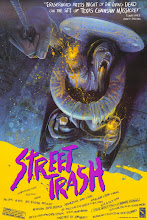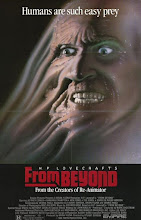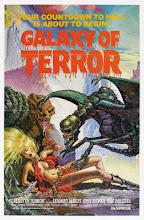The onslaught of incredible poster art for Ben Wheatley's upcoming High-Rise continues. The marketing team behind all of this really seem to get the spirit of Ballard. If this eye candy isn't enough for you, treat your ears as well with a taste of frequent Darren Aronofsky collaborator Clint Mansell's score. My excitement for this movie is now at a fever pitch.
Showing posts with label Ben Wheatley. Show all posts
Showing posts with label Ben Wheatley. Show all posts
Thursday, 3 March 2016
Wednesday, 10 February 2016
HIGH-RISE posters
What a long wait it's been for J.G. Ballard's High-Rise to reach the screen. Not only have I been following the film's progress here for six long years, but producer Jeremy Thomas has been trying to get it made for almost forty (Nicolas Roeg almost took the reins in the late '70s).
With Ben Wheatley's adaptation so close now that you can almost taste it, whet your appetite (for barbecued dog) with these three excellent posters. My favourite is the one with the falling man reflected in the car, which has an appropriately retro feel to it. Something about it reminds me of the covers of Ballard paperbacks from the '70s and '80s. Intentional or not, it's also a nice little nod to Crash.
Sunday, 27 July 2014
HIGH-RISE
Back in 2010 my fifth ever post on the EYE was about the wonderful Vincenzo Natali being attached to direct the long-in-development adaption of J.G. Ballard's High-Rise. To paraphrase myself:
"Our bizarrely evolving relationship with technology and the urban environment is a theme that runs through my favourite Ballard stories (Crash, Concrete Island and High-Rise), and I don't think that the ideas he played with in those novels have dated at all. In fact I think they're more relevant now than when they were written, showing a real prescience to Ballard's vision of where we're headed as a society (it's not optimistic).
It's heartening to know that High-Rise is in the capable hands of an intelligent, independent film-maker. Too many of Philip K. Dick's works have been reduced to dumbed-down action fests, but with first Cronenberg's Crash and now Natali at the helm of High-Rise, Ballard's cinematic legacy will hopefully fare better."
Well, that was over four years ago, the world has moved on and Natali has been off the project for a while now (I'm rooting for him to get his Neuromancer made, a daunting task to say the least). Sometimes things change for the better though, and as much as I love Natali and think he was a good match for High-Rise (there are striking thematic similarities between Ballard's novel and Cube), I think the film has fallen into even more capable hands now.
High-Rise is a distinctly British feeling science fiction novel, and the alienating, sprawling bleakness of Ballard's London has always set it apart from other 1970's dystopias. I suppose it could be transplanted to somewhere like L.A. (with its dehumanising landscape of freeways), but to really do Ballard's novel justice it should be set in the U.K.
With that in mind, the film's current director, Ben Wheatley, is perhaps the perfect choice. Wheatley, whose Down Terrace, Kill List and Sightseers (I have yet to see A Field in England) are all near flawless gems, has a uniquely English vision that seems perfectly suited to tackling '70s era Ballard.
As a filmmaker he seems genuinely interested in exploring the grimy underbelly of modern British society, albeit from some pretty weird perspectives. Whether by accident or not, the three films mentioned above are perfect examples of the social realism of Ken Loach and Mike Leigh spliced onto modern genre cinema. Be it crime, horror or black comedy, Wheatley has so far managed to effortlessly combine "kitchen sink realism" with whatever genre he sees fit.
This time around he's shifting his gaze from the struggles of the working class to that oldest and most British of conflicts: class war. There is no real proletariat living in the luxurious 40 story apartment complex of the novel, but as things start falling apart the residents quickly find themselves divided into lower, middle and upper classes... whether by choice or not. I can't wait to see how Wheatley handles this incendiary material. Will it remain rooted in naturalistic realism like his previous movies, or will it take a more mythical approach like the similarly themed (and fucking brilliant) Snowpiercer? It's also going to be really interesting to see what Wheatley does with a big budget.
Wheatley isn't the only interesting person involved with High-Rise though. The project has been patiently shepherded for over three decades by one of the most interesting producers in the business, Jeremy Thomas. I saw Thomas speak at length a couple of years ago, and he is that rarest of rare commodities among producers: a man who is genuinely passionate about leaving behind a legacy of art. Without him we might not have some of the more challenging movies from the likes of Nicolas Roeg, David Cronenberg, Bernardo Bertolucci, Jonathan Glazer, Wim Wenders, Richard Linklater, Harmony Korine, Takashi Miike and Jim Jarmusch. Seriously check out this guy's filmography, it's incredible. As far as Ballard is concerned, he was behind Cronenberg's Crash, and back in the '70s almost brought High-Rise to the big screen under the direction of Nicolas Roeg.
With a great cast that includes Tom Hiddleston, Elisabeth Moss and Jeremy Irons, High-Rise is set to blow minds when it finally hits next year. Filming began earlier this month in Belfast, Northern Ireland.
Sunday, 8 January 2012
KILL LIST
When I saw Ben Wheatley's Kill List at last year's Sydney Film Fest, I thought that it made the other horror films I'd seen there (Stake Land and Hobo With A Shotgun) look pedestrian by comparison. It seemed to me as I watched Kill List, with the memories of those other two films fresh in mind, that where they were treading some very familiar ground, this little English flick playing out in front of me was something original and exciting.
It was one of those rare times watching a movie when that little alarm goes off in your head... your eyes widen, and pulse quickening you sit up a bit straighter in your seat and think "wait a minute, I've never seen anything quite like this before". By the end of the fest it was not only my favourite horror entry, but favourite regardless of genre, beating out some other exceptionally good films such as Takashi Miike's 13 Assassins, Terrence Malick's Tree Of Life and José Padilha's Elite Squad: The Enemy Within.
That was back in June, and I wondered then if maybe I'd already watched the best movie I'd see that year. Six months later and Kill List has in fact turned out to be my favourite of 2011, and having seen it again recently I found it to be no less transfixing and haunting.

They say there's nothing really new under the sun, even in the realm of pure fantasy, where the sky's the limit and ideas should only be constrained by the extent of one's imagination (and in the case of cinema, the fatness of one's wallet). Where movies are concerned I think it's true to a certain extent, and there seems to be plenty of evidence around these days to support that claim, in the form of all the remakes, adaptations and sequels that are being foisted on us. In recent years, one method (or gimmick?) employed by a number of filmmakers seeking to inject some freshness into an original, but familiar story is the genre mashup, blend, crossover or whatever you want to call it. Sometimes it works, but often it feels too ham-fisted and ill-conceived to be really effective. Just because you clumsily shoehorn zombies and kung fu into your western doesn't mean it's going to be more exciting. To me the result is often that the whole is reduced to less than the sum of it's parts. Sometimes I'd rather just watch a good western... without the zombies. Or the kung fu.
And that's part of what makes Kill List so successful for me. I can't remember when I've seen a film combine disparate genres so seamlessly and with such a feeling of effortless fluidity. Especially given the nature of the film's structure - the different genres don't run parallel to each other so much as they are episodic, one following the other, almost neatly compartmentalised within each act of the film.
The first act is a classic example of British social realism, reminiscent of the "kitchen sink realism" of Ken Loach and Mike Leigh. I quickly found myself so engaged by the seemingly mundane trials and tribulations of the main characters, that I honestly would have been more than happy for the film to continue in this direction, without veering into more fantastic territory:
Suburban couple Jay and Shel love each other, but in spite of that their marriage is rapidly falling apart. Shel is accustomed to a standard of living that they can no longer afford, because Jay hasn't been working. There's a sense that Jay is lost at sea and frustrated, despite the outward appearance of a stable, middle class home and family life. When the strain becomes too much, and comes to a very ugly head at a dinner party with Jay's old friend Gal and his new girlfriend Fiona, Jay is forced to reconsider his situation and take on a job that Gal is offering him.
This set up, which sounds mundane, is anything but. You see Jay and Gal aren't just old mates, they're professional hitmen, with a shady past that may include some very morally dubious mercenary work in other parts of the world. The two men prepare for their new assignment... but are unaware that Fiona may not be as naive and innocent as she appears.

From here the film shifts gears, turning into a gritty, deliberately paced hitman thriller, but the change isn't jarring at all, and in fact feels perfectly natural. It continues to feel fluid and natural even as events get more and more weird - eventually steering the film into it's third genre - outright horror. I'll give nothing else away, as I think it best to go into Kill List knowing as little as possible about the second and third acts.
I can find very little to complain about in Wheatley's second feature (I need to track down his first, Down Terrace). The performances are all virtually flawless, the whole cast of talented actors are obviously having fun, and really immersing themselves in their roles. Unsurprising, because as written by Wheatley and Amy Jump, the main characters are multi-layered, complex and endearing. The cinematography is right up my alley - carefully composed and framed shots imbued with plenty of stillness, giving the film room to breath and allowing each shot to sink in deeply.
Kill List isn't exactly bursting at the seams with action (again, think of my comparison to social realist cinema), but when the violence comes, you probably won't be ready for it, and it's likely to shock you. It's sudden, realistic and very, very nasty. It got under my skin and made me feel bad. Just the way it should.
If there's one complaint that I can level at this movie it's that I slightly preferred the tone of the first two acts to the overtly horrific climax, which is surprising considering my predilection towards horror. That said I still found the conclusion to be solid and memorable, so it's a minor quibble really, and didn't effect my overall enjoyment of the film.
With Kill List, Ben Wheatley has delivered a new and exciting cult classic. If you think so too, and if you ever meet Ben, maybe you'd like to say to him:
"THANK YOU"
Some of the runners up for my top film of 2011 include Nicolas Winding Refn's Drive, Miguel Ángel Vivas' Kidnapped, Jee-woon Kim's I Saw The Devil, Lucky McKee's The Woman, Takashi Miike's 13 Assassins and Sean Durkin's Martha Marcy May Marlene.
Subscribe to:
Posts (Atom)































































































